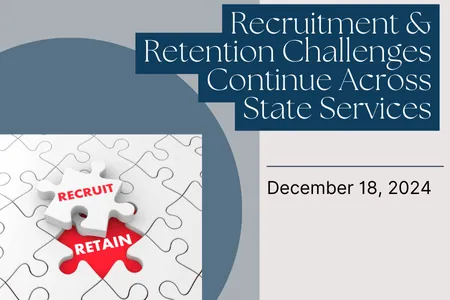Robust Benefits are Key to Solving

Agencies across our state continue to face chronic understaffing, exacerbated by ongoing recruitment and retention challenges. From healthcare and higher education to transportation and public safety, vital services that residents rely on are stretched thin, with workers burdened with the impacts of double and triple workloads. The result is a crisis that threatens Connecticut’s quality of life.
One of the most significant obstacles to resolving these issues is the erosion of competitive benefits. Connecticut’s public sector workforce has long been a cornerstone of delivering high-quality, essential services to residents. A robust pension and healthcare plan has historically served as a critical tool in attracting and retaining skilled professionals to careers in public service—careers that are often demanding, high-stress, and essential to the well-being of our communities. Oftentimes workers forgo higher-paying jobs in the private sector for the promise of these benefits to secure their futures.
When retirement and healthcare benefits do not keep pace with the cost of living, the ability to recruit and retain the next generation of workers is directly undermined. And without a clear commitment to protecting and strengthening these benefits, the state workforce risks falling deeper into a cycle of attrition, where it becomes increasingly difficult to fill critical positions and retain experienced staff.
Connecticut cannot afford to lose the talent, institutional knowledge and commitment of its public sector workforce. To rebuild and maintain the high-quality services that residents deserve, we must ensure that careers in public service remain viable and attractive. This means investing in pension and healthcare plans that provide long-term security for workers and their families. These benefits are not just compensation—they are a promise that elected officials value and respect the contributions of their workforce.
The current State Employees Bargaining Agent Coalition (SEBAC) master retirement and health contract expires in June of 2027, but it is in everyone’s interest to make progress towards a new agreement well in advance of the current expiration date. This avoids senior employees nearing retirement having to make decisions with their future entitlements uncertain. And it gives us an opportunity to address the inadequacies in current benefits offered to newer employees. Given the importance of these benefits to the state’s ability to offer accessible public services that our communities rely on, we have begun informal discussions with the Lamont Administration. The goal is to identify ways that we can work together to address these concerns and create win-win changes that improve the state’s ability to recruit and retain skilled and dedicated workers.
We must ensure that Connecticut’s public institutions are equipped to meet the needs of our communities for generations to come. It starts with protecting and enhancing the benefits that make public service a career worth pursuing.
